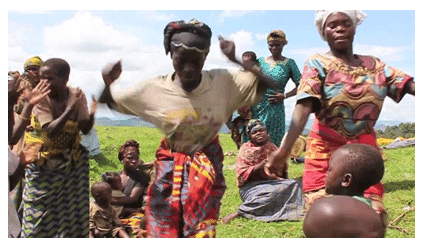 |
Musili nokage mungobi nokage muloli wa moso. (Holoholo) Mpiga ngoma na mwimbaji ndo wanafaida ila musikilizaji hana faida. (Swahili) Le tambourin et le chanteur sont les plus importants et non ceux qui suivent la musique. (French) A drummer and a singer are the beneficiary not the listener. (English) |
Holoholo (DRCongo, Tanzania) Proverb
Background, Explanation, History, Meaning and Everyday Use of the Proverb
The Holoholo (also known as Horohoro or Kalunga) are a Bantu Ethnic Group that live around Kalemie on the opposite shore of Lake Tanganyika in the Democratic Republic of the Congo. The name «Holoholo» was given to them by the Belgians. It comes from the sound of their greeting which outsiders found comical. The alternative name « Kalanga » simply means « people who were before the current population. »
The Holoholo are matrilineal Bantu people who fled from Luba Empire when it was expanding eastward in the 18th century, settling around Kalemie where Lukuga River leaves Lake Tanganyika. The Holoholo who live in Tanzania around Kungwe Mountain have a myth of origin which states that their ancestors came from the Congo side, and moved along the lake opposite Kalemie. However, they were expelled from this area to make way for Mahale Mountains National Park which created in 1985.
A brideprice is paid by a groom to the bride’s family in order for a marriage to take place. Polygamy prevails, but each wife has her own hut, After the wedding the wife moves to her husband’s homestead. A Holoholo will allow his daughter to be married to a stranger on condition that children born are allowed to return to the mother’s family at will. Villages consisting of double rows of beehive-like huts form a typical Holoholo village. These are ruled by a headman who is assisted by a council of elders. Living on the shore of Lake Tanganyika in Shaba province, these people utilize the lake for fishing. However, the Holoholo are primarily an agricultural community. Sorghum is the staple crop. Hunting is done on a small scale.
This proverb is being used daily by Holoholo people to reflect the “love, wisdom, value and equability of people living together in a group as a community or nation and mostly is love, because without love the family looks wicked and it create a gap that allows the reign of separation." As a matter of fact the Holoholo people found themselves being ruled by a stranger King from Luba tribe. But the elders did not sleep due to this matter. They applied the using of proverbs to young people. and it helped them to stand firm and strong as a community and get away from the Luba Empire and built their own community.
This Holoholo proverb teaches us that we should listen to all people regardless of who they are and where they are coming from and to avoid hatred. Mourning with mourners, celebrating with those are feasting, sharing ideas with those to whom we feel are not on the same level to us and most important to love them. It also points out a negative perceptive way which warns people not to follow because it can take you nowhere — hatred, envy, jealousy, discrimination, tribalism and hypocrisy. However, the real and stronger way of living with people and what people should dwell with is to “Love others as yourself.” Once we love people, we will be able to listen to them, and share with them in any matter that may happen.
Biblical Parallels
“Now there was found in it a poor wise man, and he by his wisdom delivered the city; yet no man remembered that same poor man. Then said I, Wisdom is better than strength: nevertheless the poor man’s wisdom is despised, and his words are not heard. The words of wise men are heard in quiet more than the cry of him that ruled among fools.” (Ecclesiastes 9:15-17)
“And God hearkened to the voice of Manoah; and the angel of God came again unto the woman as she sat in the field: but Manoah her husband was not with her.” (Judges: 13:9)
Contemporary Use and Religious Application
The world had fallen in a situation that no human being can stop its movement. “Discrimination” is now an uncured illness for human beings. It’s being supported by a few to protect their powers and leave others crying and nobody can listen to their voice. Is this the will of God for his people to do? Nevertheless, all creatures were given this place “World” to live in peace and being told that “Love should reign amongst all the nations.” People should love others like themselves for free (Matthew 19:19), and this is the will of God to his people to do.
But it’s not the case for the 21st century human being’s will who cannot play or dance for his/her neighbor’s drumbeating. He or she pretends to destroy what is good before God rather than enhancing it. He or she is ready to judge against or to kill one’s neighbor to make oneself happy instead of helping him or her. However God will bring to the oppressor all the evil and the oppressed people who obeyed to his words, will stand before him (Jeremiah 35:17-18).
Dear brother and sister, let’s not judge people because they are not our own or we are not sharing the same religion or political party. It’s doing things against the will of God. Let’s love one another regardless our colors, tribes, etc.…for that is pleasing to God.
NOTE: This Holoholo Proverb is No. 74, in a Collection of 100 Holoholo Proverbs and Wise Sayings by Elias Bushiri Elie in collaboration with the African Proverbs Working Group (Nairobi: Privately Printed, March, 2016).
Elias Bushiri Elie
Nairobi, Kenya
Cellphone: +254 735-973276
Email: e.bushiri@yahoo.com
ebushiri@gmail.com
Photographs provided by:
Cephas Yao Agbemenu
Department of Fine Arts
Kenyatta University
P.O. Box 43844
Nairobi, Kenya
Cellphone: +254 723-307992
Email: cyagbemenu@yahoo.com

